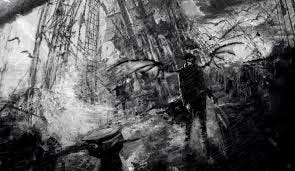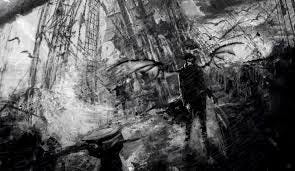The Beginning of the Demeter's Journey - Bram Stoker's Dracula - The Greatest Horror Novel Ever Written
A Change in the Winds…
Here’s the newest Dracula essay, and last time we dealt with Lucy’s sleepwalking so that this time we must carry on with the story. And on that note Mina receives no further news from Jonathan.
“Here comes old Mr. Swales. He is making straight for me, and I can see, by the way he lifts his hat, that he wants to talk.... I have been quite touched by the change in the poor old man. When he sat down beside me, he said in a very gentle way:— “I want to say something to you, miss.” I could see he was not at ease, so I took his poor old wrinkled hand in mine and asked him to speak fully; so he said, leaving his hand in mine:— “I’m afraid, my deary, that I must have shocked you by all the wicked things I’ve been sayin’ about the dead, and such like, for weeks past; but I didn’t mean them, and I want ye to remember that when I’m gone. We aud folks that be daffled, and with one foot abaft the krok-hooal, don’t altogether like to think of it, and we don’t want to feel scart of it; an’ that’s why I’ve took to makin’ light of it, so that I’d cheer up my own heart a bit. But, Lord love ye, miss, I ain’t afraid of dyin’, not a bit; only I don’t want to die if I can help it. My time must be nigh at hand now, for I be aud, and a hundred years is too much for any man to expect; and I’m so nigh it that the Aud Man is already whettin’ his scythe. Ye see, I can’t get out o’ the habit of caffin’ about it all at once; the chafts will wag as they be used to. Some day soon the Angel of Death will sound his trumpet for me. But don’t ye dooal an’ greet, my deary!”— for he saw that I was crying—“ if he should come this very night I’d not refuse to answer his call. For life be, after all, only a waitin’ for somethin’ else than what we’re doin’; and death be all that we can rightly depend on. But I’m content, for it’s comin’ to me, my deary, and comin’ quick. It may be comin’ while we be lookin’ and wonderin’. Maybe it’s in that wind out over the sea that’s bringin’ with it loss and wreck, and sore distress, and sad hearts. Look! look!” he cried suddenly. “There’s something in that wind and in the hoast beyont that sounds, and looks, and tastes, and smells like death. It’s in the air; I feel it comin’. Lord, make me answer cheerful when my call comes!” He held up his arms devoutly, and raised his hat. His mouth moved as though he were praying.”
Can I say it? I don’t understand most of what he’s saying without really thinking about it. Try being an eleven year old kid with barely any English in him.
That said, eventually I was able to piece it together, and he’s commenting on the wind and the seas. But the interesting thing is that he spots something on the horizon. Now the characters’ aren’t sure at first, but it is in fact the Demeter.
The Demeter if you will recall is the ship upon which Dracula is being transported across the seas that separate Eastern Europe from Great Britain. Dracula has journeyed a long way, and has arrived quite a bit diminished if we’re being honest.
While he might think that glory and conquest awaits, all that awaits as said is diminishment and humiliation. The reason is simple; he’s left the enchanted lands of Transylvania in favour of the disenchanted lands of England.
Modernity has struck England with such force that it has left her utterly lesser, utterly broken in some ways in comparison to the land she once was. But this thought has never really occurred to him, as he’s more fixated on the awaiting English bosoms and the taste of victory over them and their men-folk.
That said, though England is not the same land as it was in the time of Edward the Confessor, Harold II, Henri II, Henry IV, Edward IV and even James VI. There is still it must be acknowledged something of the old, impressive England that conquered the world in the 18th and 19th centuries.
It is the time of the Empire upon which the Sun Never Sets. An Empire unlike anything that was ever seen before or since if we’re being honest.
“I can’t make her out,” he said; “she’s a Russian, by the look of her; but she’s knocking about in the queerest way. She doesn’t know her mind a bit; she seems to see the storm coming, but can’t decide whether to run up north in the open, or to put in here. Look there again! She is steered mighty strangely, for she doesn’t mind the hand on the wheel; changes about with every puff of wind. We’ll hear more of her before this time to-morrow.”
It is humorous if we’re being honest that many a nations are ‘she’s’, as are ships. It’s funny and yet there’s a romanticism to it. And true Romance as all know never dies, no matter how long it is since the time of the romance itself.
Land-Ho!
“ONE greatest and suddenest storms on record has just been experienced here, with results both strange and unique. The weather had been somewhat sultry, but not to any degree uncommon in the month of August. Saturday evening was as fine as was ever known, and the great body of holiday-makers laid out yesterday for visits to Mulgrave Woods, Robin Hood’s Bay, Rig Mill, Runswick, Staithes, and the various trips in the neighbourhood of Whitby. The steamers Emma and Scarborough made trips up and down the coast, and there was an unusual amount of “tripping” both to and from Whitby. The day was unusually fine till the afternoon, when some of the gossips who frequent the East Cliff churchyard, and from that commanding eminence watch the wide sweep of sea visible to the north and east, called attention to a sudden show of “mares’-tails” high in the sky to the north-west. The wind was then blowing from the south-west in the mild degree which in barometrical language is ranked “No. 2: light breeze.” The coastguard on duty at once made report, and one old fisherman, who for more than half a century has kept watch on weather signs from the East Cliff, foretold in an emphatic manner the coming of a sudden storm.”
This is the description of what it was that lay off the coast of Yorkshire when Mina and Swale spotted the ship off the coast. Swale thinks it a Russian vessel, yet it is not clear.
The story continues after some pages of presenting the situation and describing things to we readers so that there’s nothing really to analyse. So we’ll skip to the following passage.
“Later.— By the kindness of the Board of Trade inspector, I have been permitted to look over the log-book of the Demeter, which was in order up to within three days, but contained nothing of special interest except as to facts of missing men. The greatest interest, however, is with regard to the paper found in the bottle, which was to-day produced at the inquest; and a more strange narrative than the two between them unfold it has not been my lot to come across. As there is no motive for concealment, I am permitted to use them, and accordingly send you a rescript, simply omitting technical details of seamanship and supercargo. It almost seems as though the captain had been seized with some kind of mania before he had got well into blue water, and that this had developed persistently throughout the voyage. Of course my statement must be taken cum grano, since I am writing from the dictation of a clerk of the Russian consul, who kindly translated for me, time being short.”
The theory by the coastguard is mania that drove someone to horrific acts of murder. It’s a little funny if you think about it as they have the evidence staring them in the face as there are few corpses. Not that of a vampire but of something having gone horribly awry, and yet none of them can quite understand it, none of them can figure out what happened so they assume that it was not a crew member but someone else.
“On 16 July mate reported in the morning that one of crew, Petrofsky, was missing. Could not account for it. Took larboard watch eight bells last night; was relieved by Abramoff, but did not go to bunk. Men more downcast than ever. All said they expected something of the kind, but would not say more than there was something aboard. Mate getting very impatient with them; feared some trouble ahead.
On 17 July, yesterday, one of the men, Olgaren, came to my cabin, and in an awestruck way confided to me that he thought there was a strange man aboard the ship. He said that in his watch he had been sheltering behind the deck-house, as there was a rain-storm, when he saw a tall, thin man, who was not like any of the crew, come up the companion-way, and go along the deck forward, and disappear. He followed cautiously, but when he got to bows found no one, and the hatchways were all closed. He was in a panic of superstitious fear, and I am afraid the panic may spread. To allay it, I shall to-day search entire ship carefully from stem to stern.”
This part of the story is about the journey of the Mercedes. It makes it clear that around July 17th the first crew-member of the Demeter disappears. This is one of the most important moments in the story so that we now get something of a ‘Slasher’ style event that sees much of the ship crew butchered like cattle.
I must admit that I really like this part of the story, as it is one of the most terrifying and has the most potential for a movie if only a decent studio had produced it unlike the one that did.
“Later in the day I got together the whole crew, and told them, as they evidently thought there was some one in the ship, we would search from stem to stern. First mate angry; said it was folly, and to yield to such foolish ideas would demoralise the men; said he would engage to keep them out of trouble with a handspike. I let him take the helm, while the rest began thorough search, all keeping abreast, with lanterns: we left no corner unsearched. As there were only the big wooden boxes, there were no odd corners where a man could hide. Men much relieved when search over, and went back to work cheerfully. First mate scowled, but said nothing.”
Here we see the problem with cushioning people. The First Mate initially believes that to tell the crew that there’s someone aboard the ship will only demoralize them. The trouble is that by not opening his mind to the possibility he spreads the idea of the unknown that is to say that there’s something killing crew-members that cannot be tracked, is unknown and cannot be determined.
This demoralizes them even more and even faster.
This is the difference between wanting to rip the band-aid off and just extending the moment.
Psychologically the First Mate’s idea makes no sense. It is a really bad idea. It is bad because it involves denial. You must bend to the Truth or you will be conquered by it. This is the way of the world.
It is also because of this reason that Dracula defeats them, and they do not defeat him as the ‘Knights’ of our story do: The heroes bend to the Truth. They are presented with irrefutable evidence and accept it.
The Heroism of Truth
There is heroism in being able to accept the world for what it is. This is the first step towards acknowledging things. You have to accept that not all are created equal. Only an imbecile or a child thinks that. Some are born stronger, some wiser and some are innately greater. Still others are lesser.
The reason this lesson pertains to this particular story is that the crew of the Demeter panic when reason ought to have won out. They prefer to care about demoralization, more than they do about what they’re dealing with. They also collapse under the pressure if we’re being honest.
This is something that the heroes don’t do.
The reason Jonathan survived and they didn’t is that he looked the darkness in the eye and didn’t blink. He looked at the facts and pressed forward. The ship crew search the ship, fail to find whomever it is that is hunting them and stop there. They get lazy with their own survival.
They worry more about a modern idea of the social order with the Captain wanting to lay the facts as they are to the crew. You can’t be worrying about such things when you’re in this sort of situation.
It’s what separates Van Helsing from the Captain; he faces things head on and deals with them in that manner. He doesn’t let himself become dragged down by fear of lowering morale. There are ways to deal with such a situation without being dragged down such as how Caesar, Augustus or many other military commanders did historically.
**********
Also Crown of Blood has a new edition, with maps, character bios and more!






I know Stoker was trying to be realistic using that old country English dialect (But don’t ye dooal an’ greet, my deary!”), but it's hard to decipher all those years later. I'm so glad Penguin Classics puts annotations to explain this stuff in their books.